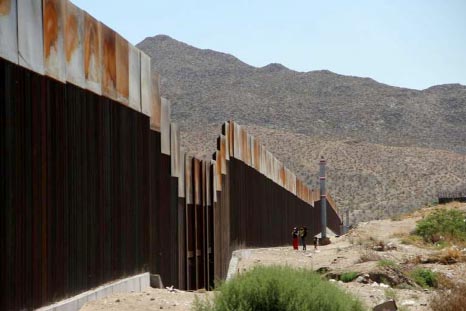
AFP, Washington :
President Donald Trump insisted Sunday that the US Congress must find a way to pay for his promised border wall, branding Mexico a hotbed of violent crime.
And he warned both Mexico and Canada that if they continue to be “difficult” in trade talks, he make have to break off attempts to reform the NAFTA free trade pact.
Both positions put Trump on a collision course with many skeptical US lawmakers as much as they do with neighboring capitals, but remain popular with his electoral base.
“With Mexico being one of the highest crime Nations in the world, we must have THE WALL. Mexico will pay for it through reimbursement/other,” Trump tweeted Sunday.
“We are in the NAFTA (worst trade deal ever made) renegotiation process with Mexico & Canada. Both being very difficult, may have to terminate?”
Trump’s positions on the wall and trade are well-known, and both were centerpieces of last year’s White House campaign, but they may now run afoul of political reality.
US lawmakers return from their summer recess on September 5 needing to come up with a deal to fund the government and raise the federal debt ceiling.
The Republican majority wants to cut taxes and pass a costly infrastructure bill, but Trump has threatened to trigger a government shutdown unless it funds his wall.
During his campaign, Trump repeatedly insisted that the multi-billion dollar cost of the wall would be borne by Mexico, an idea scornfully dismissed by Mexican officials.
Now-while this remains a centerpiece of his populist speeches-he accepts US funds will pay for construction, and Mexico will be forced to re-pay in some way later.
But Democrats oppose including wall spending in the spending bill, and Republican leaders will struggle to pass it, while also opposing a government shutdown.
Trump’s homeland security adviser Tom Bossert attempted to explain the contradiction in an interview with ABC News. “What we’ll do here is go through the mechanism of getting the original initial money that we need for that capital project from Congress through an appropriations process and we’ll responsibly construct the barrier on the border,” he said.
“As we work with the Mexicans in other policies and trade policies and such, we’ll determine ways for us to make that right.”
At Trump’s instigation, the United States, Mexico and Canada began renegotiating the 23-year-old trade deal earlier this month.
Trump has repeatedly called the agreement a “disaster” that exported US jobs to Mexico, while Mexico has dismissed his rhetoric as a negotiating tactic playing to his US base.
Mexico-which sells 80 percent of its exports to the US-is not interested in sweeping changes, and Canada is wary.
President Donald Trump insisted Sunday that the US Congress must find a way to pay for his promised border wall, branding Mexico a hotbed of violent crime.
And he warned both Mexico and Canada that if they continue to be “difficult” in trade talks, he make have to break off attempts to reform the NAFTA free trade pact.
Both positions put Trump on a collision course with many skeptical US lawmakers as much as they do with neighboring capitals, but remain popular with his electoral base.
“With Mexico being one of the highest crime Nations in the world, we must have THE WALL. Mexico will pay for it through reimbursement/other,” Trump tweeted Sunday.
“We are in the NAFTA (worst trade deal ever made) renegotiation process with Mexico & Canada. Both being very difficult, may have to terminate?”
Trump’s positions on the wall and trade are well-known, and both were centerpieces of last year’s White House campaign, but they may now run afoul of political reality.
US lawmakers return from their summer recess on September 5 needing to come up with a deal to fund the government and raise the federal debt ceiling.
The Republican majority wants to cut taxes and pass a costly infrastructure bill, but Trump has threatened to trigger a government shutdown unless it funds his wall.
During his campaign, Trump repeatedly insisted that the multi-billion dollar cost of the wall would be borne by Mexico, an idea scornfully dismissed by Mexican officials.
Now-while this remains a centerpiece of his populist speeches-he accepts US funds will pay for construction, and Mexico will be forced to re-pay in some way later.
But Democrats oppose including wall spending in the spending bill, and Republican leaders will struggle to pass it, while also opposing a government shutdown.
Trump’s homeland security adviser Tom Bossert attempted to explain the contradiction in an interview with ABC News. “What we’ll do here is go through the mechanism of getting the original initial money that we need for that capital project from Congress through an appropriations process and we’ll responsibly construct the barrier on the border,” he said.
“As we work with the Mexicans in other policies and trade policies and such, we’ll determine ways for us to make that right.”
At Trump’s instigation, the United States, Mexico and Canada began renegotiating the 23-year-old trade deal earlier this month.
Trump has repeatedly called the agreement a “disaster” that exported US jobs to Mexico, while Mexico has dismissed his rhetoric as a negotiating tactic playing to his US base.
Mexico-which sells 80 percent of its exports to the US-is not interested in sweeping changes, and Canada is wary.

